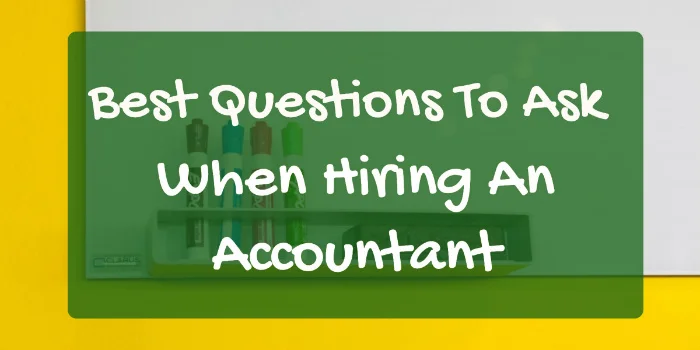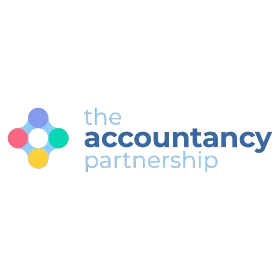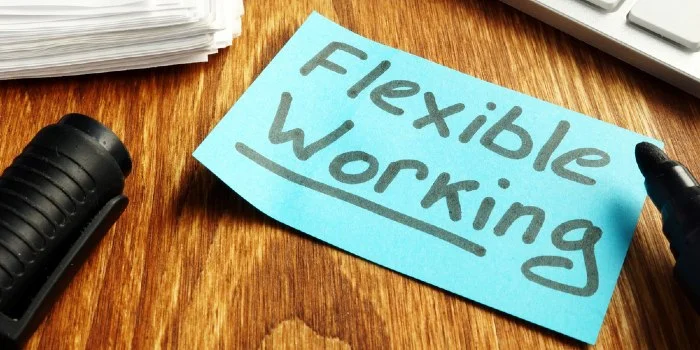Accountants do more than just handle your tax. For businesses of all sizes, accountants are a must-have essential to help you reach the next level.
They keep on top of all your financial records and handle your bookkeeping. They’ll take care of any auditing, PAYE payrolls for your employees and all government-related paperwork that needs completing. They ensure you never miss a deadline – and keep you HMCR compliant at all times.
Put simply, accountants are the time-saving miracles that keep you financially legal, compliant and up-to-date.
Combined with U.S. bank study findings that 82% of businesses fail due to poor cash flow management, getting an accountant you can trust should be pretty high on your priority list.
If that’s not enough to convince you, you can discover more about how an accountant can help your business succeed here.
Getting the right accountant for your business is no easy task though. To make it a little easier, we’ve compiled a quick guide on getting the right match for your company and the top 5 essential questions you need to ask before choosing your accountant.
Do you legally need an accountant in the UK?
It’s not a legal requirement in the UK to have an accountant for your business. The only legal requirement is to submit your annual returns accurately and on time (which accountants can help you do).
Accountants can be an incredibly helpful asset for your business, helping you take control and manage your finances, prepare your documents and provide advice and guidance at key moments of your business.
Should businesses be spending money on accounts?
Interestingly, according to our research, 61% of new business owners say they intend to avoid using an accountant. Paul Bryant, founder of Business4Beginners, said that these results weren’t too surprising given that many business owners are looking for ways to cut costs.
However, given the opportunity and help that accountants can offer, businesses should weigh up how accountants could bring long-term savings and free up more time for business owners to focus on the business.
We can’t definitively say whether or not you need an accountant. That depends entirely on your skills, resources and needs. What we will say, though, is that before you make a decision on hiring an accountant or not, you need to think deeply about what it is your business needs and whether you have the time and capacity to handle these needs yourself.
Let’s explore this a little more in the next section.
Lost the buzz for your business?
Starting a business is exciting. Succeeding is rewarding. The bit between is hard, repetitive, and full of self-doubt.
The Lonely Middle Club (From Business4Beginners) helps you through it:
Get support and advice from other small business owners
Remove the self-doubt that’s holding your business back
Learn techniques and strategies to grow your business faster
Be inspired with our exclusive ‘swipe’ file and AI-powered tools
No pressure – work at YOUR pace, towards YOUR goals
—
Decide what you need from your accountant
Before you can find an accountant for your business, you need to determine what you need them to do.
Are you looking for someone just to handle your bookkeeping? Someone to make sure your tax is correct and compliant?
Or an all-in-one accountant who will take care of every financial need your business has?
Deciding this will depend on how many of these services you’d like to keep in-house and which you want to hand over. And like any business decision, there are pros and cons to each.
Every service that you keep in-house gives you more control over them. They can be more cost-effective, too, as you’re not paying fees for someone else to take care of it for you.
And with easy-to-use programs like FreeAgent, QuickBooks or FreshBooks, you don’t technically need an accountant to do this for you.
Let’s set the picture with some real examples from 3 different businesses at different stages in their start-up journey.
- Jerry has been running his carpentry business as a sole trader for a few years. Recently, he’s been getting more commissions and bigger projects – so much so that he can’t handle it alone. He’s looking to expand his business to deal with growth and needs some help and advice on the best way to do so.
- Lizzie also runs her small fashion business as a sole trader. Things are steady and consistent for her, but she’s never been the best with her fiances. She needs help tracking her cash flow and preparing for her tax return.
- Gary has big plans for his plumbing business – but hasn’t taken the first step yet. This is his first business, and he wants help setting up his finances, picking the right company structure and sourcing financing for his start-up equipment costs.
Jerry, Lizzie and Gary all have different accounting needs. Exploring this step first, Lizzie decides that accounting software will be able to solve her problems and opts for this option instead, using our reviews of the best accounting software to find her match.
However, Jerry and Gary still have needs that software alone cannot solve. This makes them ready for the top questions to ask when hiring an accountant…
Which Accounting Software Is Right For You?
Answer 5 multiple choice questions to get a personal recommendation:
There are tons of resources and help at your fingertips to help you through the processes. In fact, we’ve got our own bookkeeping for beginners guide to easily get you started on keeping your own books.
But with 60% of small business owners stating that they don’t feel knowledgeable about accounting and finance, this is not always possible.
It will take some experience and learning to make sure you’re doing this right. That’s a lot of time invested into doing it yourself – which could be better used for something else if you hired an accountant to take care of it for you.
Once that’s decided, it’s time for your first meeting with an accountant, and these all-important questions…
1. What are your fees?

Sometimes this question can be a little awkward, but it’s an important one to get out of the way pretty quickly.
After all, if a particular accountant doesn’t fit in your budget, they’re not right for you. End of story.
So, ask how much their fees are.
Accountancy costs differ based on each person and the services they offer. If you head straight to the major firms, be prepared for bigger price tags. For small businesses and those just starting out, go to smaller firms or freelancers for a fee that might be more in your budget.
Just be wary of trying to get too much for nothing. Accountants don’t work for peanuts. If you’ve got a strict budget, you may need to revisit what tasks you need them to do and what you can internalise.
EXCLUSIVE OFFERS – Save On Your Accountancy Costs
2. What services do you offer?
As briefly discussed earlier, accountants offer a wide range of services. Just as your business might not need all of them, some accountants don’t offer them all.
Some accountants offer everything under the umbrella, while a few specialise in certain areas, like bookkeeping or tax return. So this question is vital to make sure that they can provide all the services that you need from them.
If you’re after a specific service, it may be best to head to a specialist in that area.
Think of it as you’re getting your house renovated. The project is nearly complete, but you need one person to fit the bathroom. Would you rather call someone who specialises in bathrooms or a general handyman that has fitted them before?
Don’t get us wrong, we’re sure that handyman could do an excellent job. But when you’re after one, specific service, you get better attention to detail and reassurance going with someone who just does bathrooms.
3. What experience do you have?
You would never hire someone without finding out if they’re qualified for the job.
Discovering an accountant’s past experience is vital to making sure that they are capable of working with your company.
Always ask what experience they’ve had. Ask what types of companies they’ve worked for before and what success they’ve had. If there are case studies available, get those too.
When asking for experience, don’t get blown away by big names. What you’re looking for are companies that are in similar positions to yourself.
Let’s go back to our earlier examples. Both Jerry and Gary ask the same accountant firm about their experience and were wowed with a whole portfolio of existing companies that they had helped grow over the years.
For Jerry, who is looking to grow from his current position, this is exactly what he needs to hear. They have exact knowledge and experience working with similar companies who have faced the same problems. This is great for putting Jerry at ease and making the firm a great choice for him.
However, the same is not true for Gary. Gary isn’t interested in growth yet – he’s yet to set up his business! This experience isn’t relevant to him, which ultimately means this firm might not be the best match. Sorry, Gary. What works for one business might not work for yours.
Recommended – Top-Rated Online Accountant:
4. How often will you meet?

If things are going well, this is where you start to get into the nitty-gritty details of how this accountant will work with your company and how often their services would be required.
Word of warning: be wary of those that only offer you a once a year meeting.
Sure, you’ll save money, but if you’ve got a tax problem you won’t be able to spot it until it might be too late. We’d recommend meeting more often, such as quarterly, to make sure that everything in your business is in tip-top shape.
This is also a good chance to bring up exactly how you’ll communicate with them. This could be:
- Entirely online or over email.
- Video or phone calls.
- In-person by physically working in your office for certain days of the year.
- Regular face-to-face meetings to discuss the current shape of your business.
All businesses have their preferred way of doing this. There’s no right or wrong answer here, it all depends on what you feel is the right approach for you.
5. What feedback can you give on my current accounting system?
If you’re already trading, asking your accountant about the current system that you use is a great way to test for on-the-spot knowledge and experience working with businesses like yours.
Just don’t expect them to completely re-do your finances for free. This isn’t a cheat to get free accounting work – just to get some indication back on how much your accountant will be able to help you.
If you are like Gary and haven’t set up your business yet, this question can be replaced with asking them what they think the best company structure to use is and how they would set up your finances.
6. How will you help me during tax season?
This is a great question if you want your accountant to help you prepare your end-of-year accounts. This question will give you detailed insights into how they handle all the accounts for their clients, how they can help throughout the year to gather the right information and how they check to make sure that you’re claiming tax savings possible for your business.
7. How will you help improve the company?
This final question will really solidify whether or not you’ve got the right accountant for your company.
It’s easy to get an accountant that can offer you the bare minimum. But that’s not what you want.
A good accountant doesn’t just make sure that you’re compliant. They’ll work with you to streamline your processes, make sure you’re always using the best systems available for your business and discover ways to help legally minimise your tax commitments.
With an accountant like that, your business can really go far.
Ask the right questions
The right accountant for your business should be in your budget, able to offer the services you need and work alongside your company to help take you to the next level.
These questions are designed to help make sure you’re on the right tracks. But that’s not all you can ask them.
When it comes to hiring an accountant, don’t be afraid to ask questions.
You need to find someone who is the right fit for your company. Otherwise, you’ll be paying for someone that doesn’t offer too much for the long run.
Top-Rated Online Accountants:
| Accounting Software | Cheapest Package | Value For Money | Our Rating | Review | Official Site |
|---|---|---|---|---|---|
 | £24.50/mo | Excellent | 9.4 | Read Review | Visit Website |
 | £42/mo | Good | 9.3 | Read Review | Visit Website |
 | Variable | Good | 9.1 | Read Review | Visit Website |










